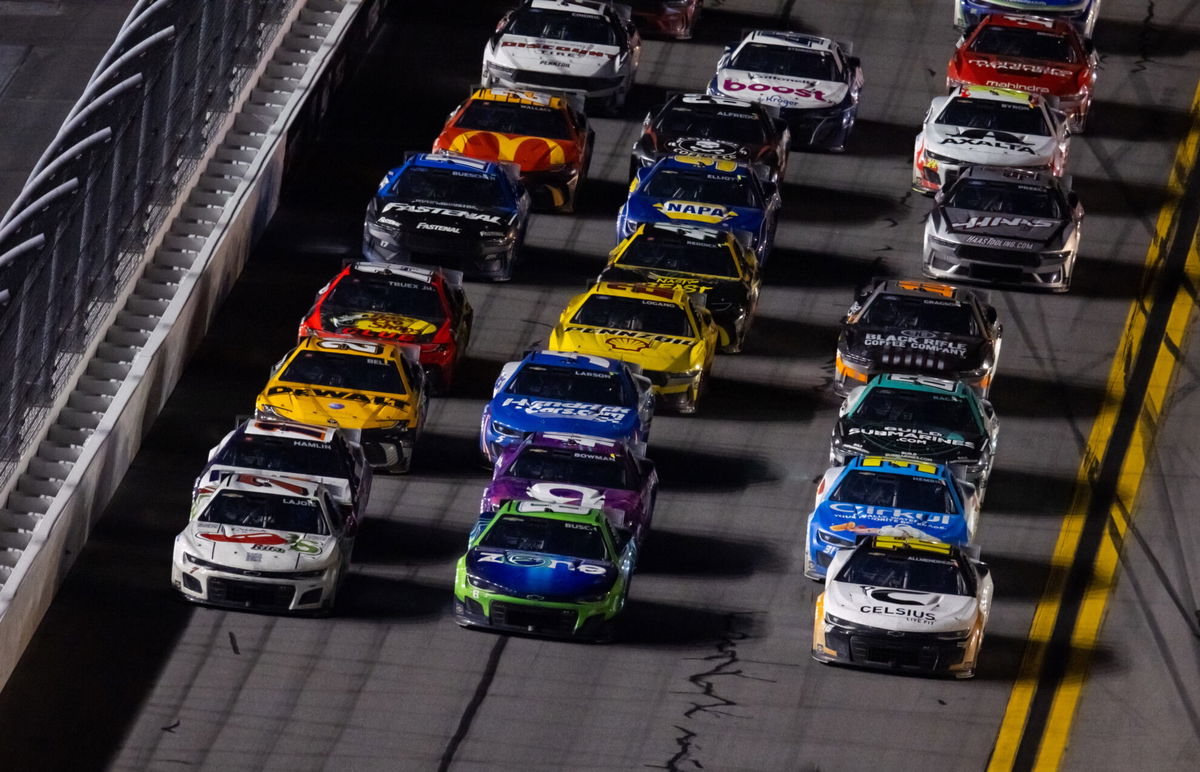
Imago
Photographer:Nigel Kinrade / NKP / Motorsport Images

Imago
Photographer:Nigel Kinrade / NKP / Motorsport Images
Do the current OEM partners have unnecessary power to influence how NASCAR races are run? This seems like a pertinent question now that the Martinsville race produced Spingate 2.0-like scenes. Chevrolet and Toyota drivers have been accused of race manipulation, precisely for two incidents, both pulled to help manufacturer teammates try to advance to the Championship 4 in the closing laps. But NASCAR ruled against it with an iron fist!
Watch What’s Trending Now!
Personnel suspensions for the upcoming Phoenix race, $200,000 eachacross separate owner and driver penalties, and 50 docked points from the points standings for 23XI Racing, Richard Childress Racing, and Trackhouse Racing. But that wasn’t deemed enough. A call was made to OEMs: “We were very clear about our intentions going forward. Do we have a rule right now where we could do something? We don’t. Will we have a rule next year? 1,000%,” NASCAR COO Steve O’Donnell confirmed.
Is the arrival of the 4th NASCAR manufacturer the reason behind this shift? Or shall we say, there couldn’t have been a more opportune moment than now? Whatever it is, one can’t help but look at the irony! On one side, we had a “p*ssed” O’Donnell for what transpired on Sunday — radio chatter evident of discussing “the deal” between two Chevrolet drivers (Ross Chastain and Austin Dillon) and their spotters before they decided to run side-by-side for the remainder of the race to prevent from giving a sliver of a chance to Ford’s Brad Keselowski from passing playoff-contending William Byron. But on the flip side…
ADVERTISEMENT
We have NASCAR President Steve Phelps talking about several new pending OE deals on Friday! Phelps said,
“Yeah, we’ve had a number of discussions. We’re in different phases depending on the OEs (manufacturers). I won’t get into exactly where those are and who they are, but we have an OE that is close. That OE has buy-out from those that are in the racing portion of that. So it really just comes down to the business portion and can we strike a deal that is advantageous for them and for us? Are we the right fit for their brand?
“But I’m cautiously optimistic, and then we need to being accelerate the other discussions we’ve had because I think, in our opinion, five is probably the right number of OEs. Obviously, we’re at three right now. We are a couple of years away.
ADVERTISEMENT
“It takes a while obviously to get up and running, but we’re excited about it because we would like to have another OE or two. So do our existing three OEs (Chevrolet, Ford, Toyota). They want to have additional competition from additional OEs for a number of reasons.”
Well, the rumor mills were in full swing from early in the season, and the name that came forward was Honda. NASCAR’s senior vice president, John Probst, has hinted about the arrival of the new OEM in March. “A timeline for a new OEM coming into our sport is somewhere in the 18-24 month period… It would take a lot of effort and, frankly, a little bit of luck to get everything to line up perfectly to do that.” Well, it turns out that since then, NASCAR has indeed made headways in streamlining the process.
ADVERTISEMENT
Phelps says a fourth OEM is “close” to entering the sport and negotiations are ongoing to make that deal happen. “I’m cautiously optimistic.”
— Jordan Bianchi (@Jordan_Bianchi) November 8, 2024
The Japanese manufacturer Toyota is the latest entry as a NASCAR OEM partner that came back in 2007. And ever since Dodge pulled the plug on its racing operation, NASCAR has been on the lookout for a fourth OEM. It is hard to see a potential Honda car running on the ovals the very next year, but 2026 is a realistic expectation.
ADVERTISEMENT
New OEM partners would need teams and charter
Funny how everything right now in NASCAR circles down to charters. Times have changed since Toyota and Dodge joined the sport. Now, for a new manufacturer to mark its entry, they would need more than just financial muscle. Firstly, they require a team willing to run Honda cars; currently, all the teams are either backed by Chevy, Toyota, or Ford.
While this process is streamlined by the arrival of the Next-Gen car, you will still need to find racing organizations willing to roll out Honda’s. There’s also a possibility of Honda rolling out its own new team, but in that case, they would need charters, right? This is where 23XI Racing and FRM‘s lawsuit comes into the picture.
Given that NASCAR has a pretty good track record with legal proceedings, they can take control of the charters controlled by the two teams. The teams haven’t signed a new deal, which makes their control of the charter null and void. Even if they manage to retain their charters, there’s a big question mark on their purchase of the third one from Stewart-Haas Racing.
ADVERTISEMENT
And this is where the two charters would allow Honda to enter the NASCAR Cup Series. Although it is a long shot, it is in the realm of being possible given how 23XI and FRM are on the backfoot with their legal dispute.
ADVERTISEMENT
ADVERTISEMENT
ADVERTISEMENT

